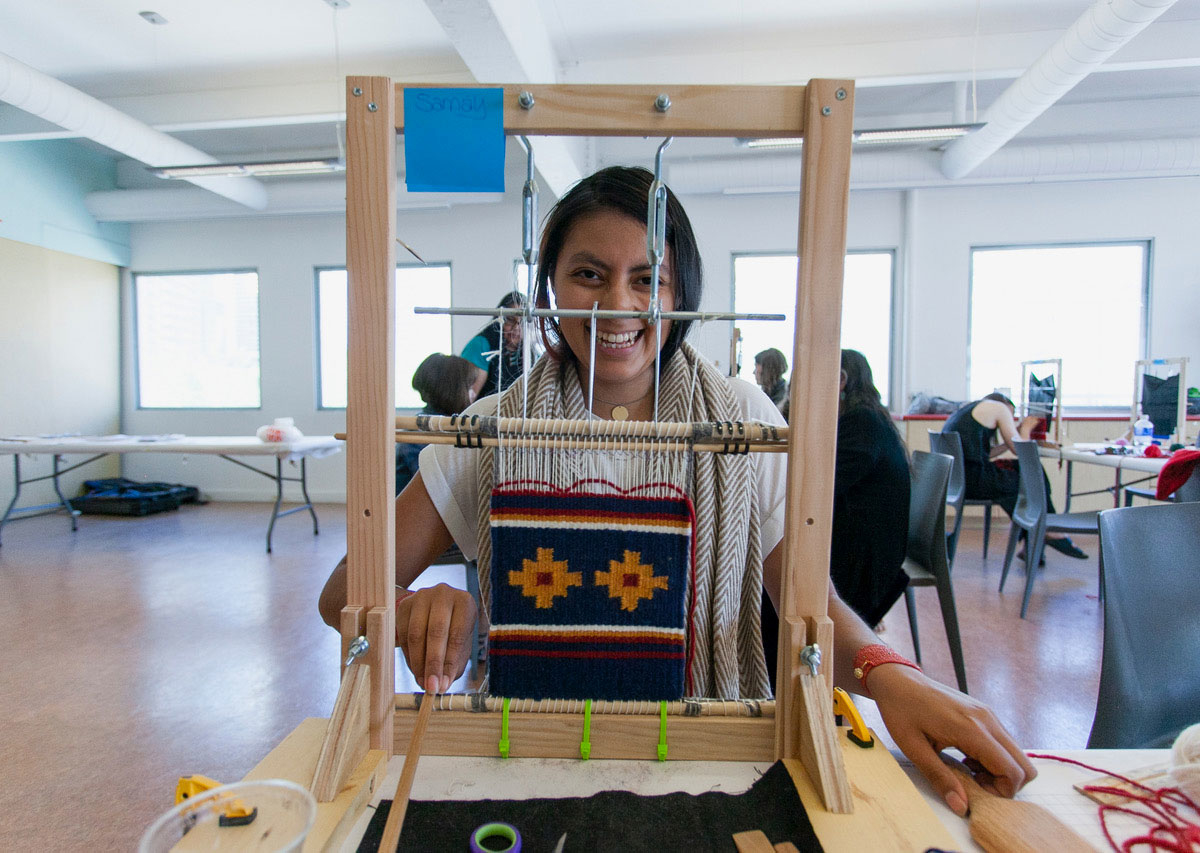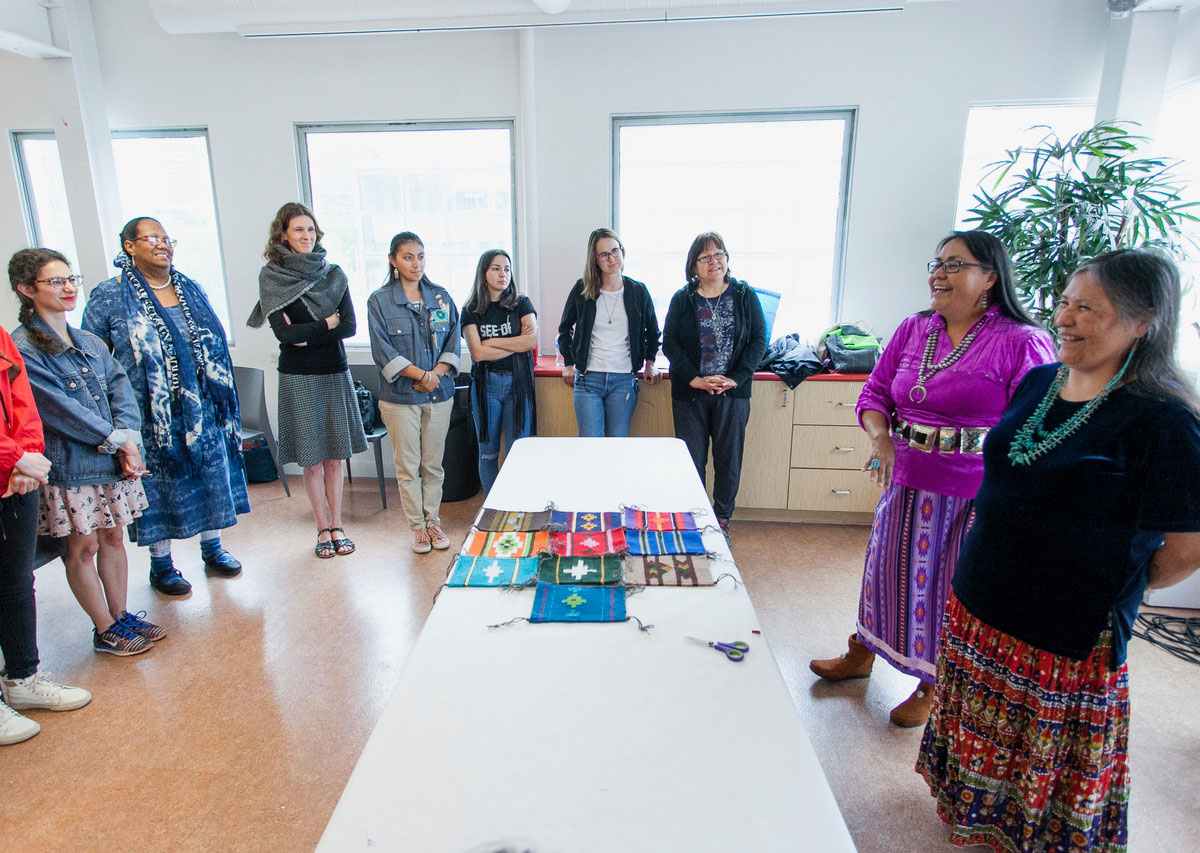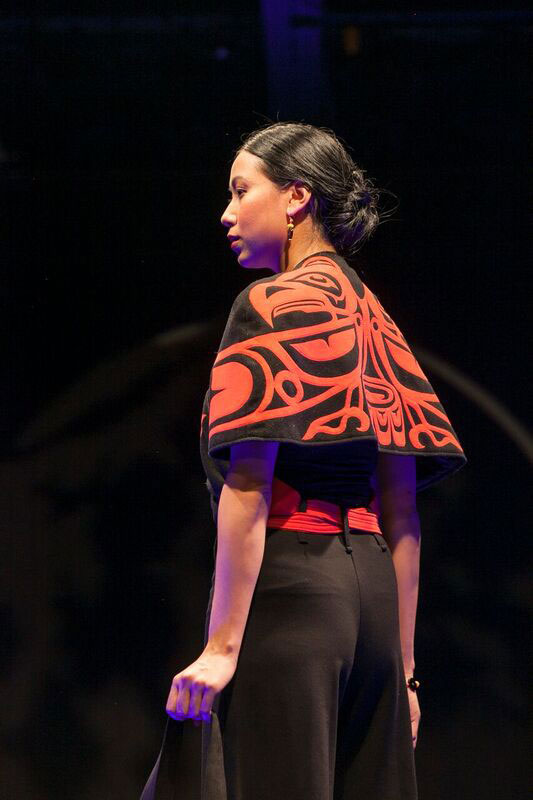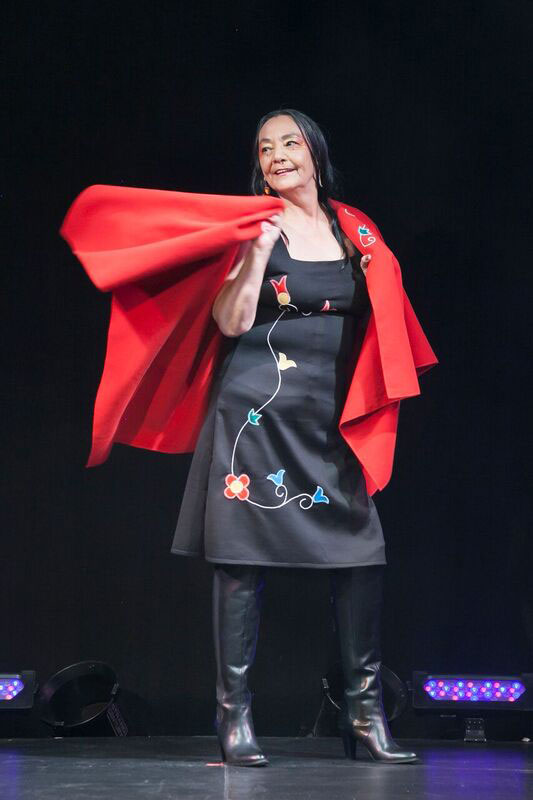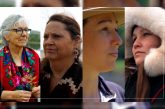
Delina White at the Harvest Moon runway showcase on June 2, 2018. All images in this article by Nadya Kwandibens / Red Works Photography.
The first annual Indigenous Fashion Week (IFWTO) Toronto had four days of workshops, curated exhibitions, artist talks, runway showcases, panels, lectures, hands-on workshops and a trade and consumer marketplace from May 31 to June 3, 2018. The idea germinated as a dream for Founder and Artistic Director, Sage Paul. Paul is also an urban Dene woman from English River First Nation and a Toronto-based artist. She is an innovative leader in fashion, craft and textiles, a strong advocate for cultural appropriation, and a trailblazer for her ground breaking work in the industry of Indigenous fashion having established Setsuné Fashion Incubator in 2015. She has also collaborated with IKEA Canada to design a collection of textiles, napkins and towels with Indigenous motifs.
Paul’s dream team and dynamic duo, Kerry Swanson, Development Director and Heather Haynes, Curatorial Advisor/Producer were integral to Paul’s actualization of IFWTO. Paul gives her perspective of actualizing such a progressive and immense undertaking. She states that it creates a space that uplifts, empowers and celebrates artists and unites communities from Greenland, Yukon, The Arctic, Alaska, and across North America.

“It feels like something has been here forever, I think it’s because our work has been here and our People. That’s the feeling I get with everybody here and coming together,” says Sage Paul. Indigenous people have been here for centuries, long before European contact and colonization. Toronto is known as ‘the meeting place’ and we continue to honour and feel how strong Indigenous land really is. New relationships are forging between the artists and people in the industry, increasing representation and creating visibility for Indigenous artists giving them a voice to empower, educate, and for self-expression.
IFWTO is led by Indigenous women and most of the designers are women. Paul expresses, “Indigenous women are the leaders of the community; they are able to teach and pass along traditional teachings, medicine, ceremonies and life experiences. I believe that the energy from Indigenous women helps create an atmosphere of generosity, kindness, love and commitment for IFWTO.” Paul philosophizes that what these women bring, especially in the context of Canada’s missing and murdered Indigenous women and girls, is a focus on uplifting Indigenous women and bringing strength to one another. Learning from one another whether it’s from Elders or the younger generation; it’s important to let voices be heard. Many of the designers are established and represent a variety of communities whether it’s on or off reserve, to be able to see artists, story tellers, and designers brings a sense of home to Toronto’s Harbourfront Centre for this truly significant event.
Paul’s advice to young Indigenous people is to have good relationships, listen, be kind and do a lot of research. This process will support their vision, whether they are creating a line of streetwear, bathing suits, using different types of fur, creating a collection of weaving—and learn everything about it—it creates a clear understanding of one’s approach. Also, have a supportive team of good people that will help see the vision through.
Another significant aspect of IFWTO, Paul points out, is that it brings attention to how it is unlike any other fashion week—those which mainly look at the commercial side of fashion. Indigenous Fashion Week is not just about selling a garment. The development of work that is invested into making a garment originates in intergenerational storytelling. “To retell these stories in ways where fashion is a medium; to present these within diverse programming creates a holistic view of how fashion can be redefined as art,” says Paul. “It shows how much work goes into each garment that is being made. It is not mass-produced fashion work. This comes from our communities from all over, and it comes from our grandmas, our sisters that are creating this work and it’s not just a product or a garment. To be able to show that in the workshops and art exhibits, and to use it to educate, helps to conceptualize what Indigenous fashion really is.”

An eclectic audience attended the festivities, many from the Toronto community, to show their support and pride for contemporary Indigenous fashion. The cohesiveness of the Aboriginal fashion community and its diversity was impactful to the fashion designers. “Presenting each of these artists gives an opportunity to show how diverse our nations are; to share the types of stories of where we come from and pass on stories from ancestors,” says Paul.
The result is the majority of the designers are connecting and collaborating on future projects with their colleagues from different Nations. Without IFWTO these opportunities may not have been possible.






